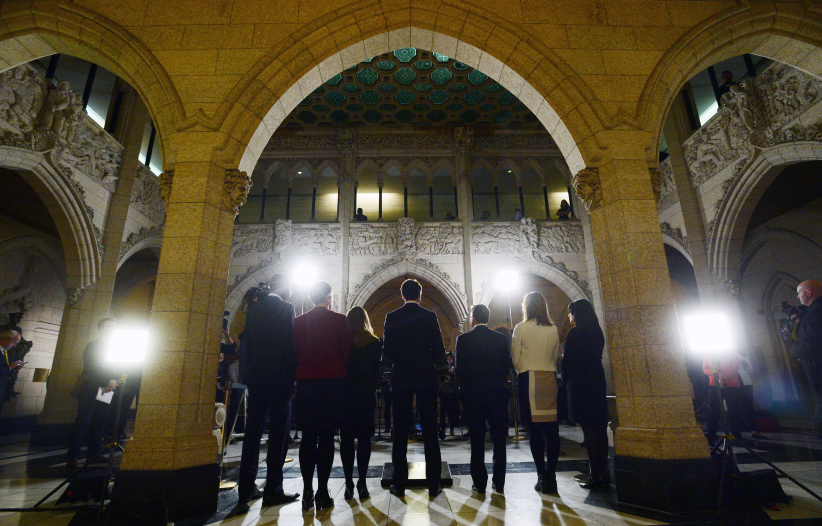The one problem with Justin Trudeau’s new team
Why Canada’s new ambassador to China, and the Liberals’ ugly ties to Beijing, will make the work of a smart new cabinet even harder
A military band conductor leads the band at the close of the annual National People’s Congress held in Beijing’s Great Hall of the People on Wednesday, March 16, 2016. (Ng Han Guan/AP)
Share

Prime Minister Justin Trudeau’s top-tier team makeover on Tuesday adds and elevates a great deal of gravitas, fresh energy and intellectual heft around the federal cabinet table. On the face of it, all is well, the government is in good hands, and at last, coherence and consistency can be expected to define the Trudeau government’s policy priorities. On the face of it, anyway.
Most prominently, the tough, whip-smart and indispensable Chrystia Freeland takes over as Foreign Affairs Minister from the mumbling, shuffling, and always well-meaning Stéphane Dion. The erudite and talented first-time MP Ahmed Hussen, himself a former Somali refugee, takes the high-profile Immigration, Citizenship and Refugees portfolio from the creaking Liberal party fixture John McCallum. Bravo.
RELATED: Everything you need to know about Trudeau’s cabinet shuffle
Even the second-tier cabinet shuffling—Maryam Monsef’s shift from Democratic Institutions to Status of Women, the bright young Karina Gould’s appointment in Monsef’s place, the hard-working neophyte MP Patty Hajdu’s move from status of women minister to labour minister, and former corporate lawyer Francois-Philippe Champagne’s move into Freeland’s former post as trade minister—all of this improves Trudeau’s cabinet bench strength.
The abrupt and necessary departure of Dion caught nobody by surprise. He’s said to be mulling a European diplomatic post offered as consolation, but to take Dion at his word, he’s not unhappy to be gone from Parliament. In a prepared statement, Dion said he never expected to spend 21 years in politics anyway, and had only gotten into the game because former prime minister Jean Chrétien asked him to. “I was envisaging a brief parenthesis in my life,” he said, concluding: “I emerge full of energy … renewable! But politics is not the only way to serve one’s country. Fortunately!” Fine, then. For now at least, adieu!
So what’s not to like?
As notable as anything that was announced at Rideau Hall on Tuesday was McCallum’s posting as ambassador to the People’s Republic of China. This was by no means a leave-taking from the apex of federal politics. The Liberal party’s unseemly preoccupation with deepening Canada’s ties to the police state in Beijing, and all the obsequious kowtowing and favour-currying that goes along with it, is now McCallum’s full-time job.
This is where incoherence, inconsistency and an embarrassing grubbiness threaten to derail what Trudeau says he hopes to achieve: a sophisticated and principled Canadian adaptation to the strange new world emerging from Donald Trump’s imminent ascendancy to the White House.
MORE: Chrystia Freeland, a foreign minister for the Trump era
Freeland is being tasked with ensuring that Canada triangulates unscathed around Trump’s open hostility to Beijing, his shadowy intimacies with Moscow, and his protectionist hostility to the terms of the North American Free Trade Agreement, a structural keystone that holds the Canadian economy together. On top of everything else, Freeland will continue to chair the cabinet committee on Canada-U.S. relations, and she’ll also retain responsibility for key ongoing Canada-U.S. trade imbroglios. It’s not going to be easy, despite Freeland’s talents. She’s a Rhodes Scholar, fluent in Russian and Ukrainian. When she was first elected in 2013 she was a veteran financial journalist with expertise in Russian and European economics and politics. She’s also the author of the bestselling Plutocrats: The Rise of the New Global Super-Rich and the Fall of Everyone Else.
As an opposition MP, Freeland earned the honourable distinction of being among 13 Canadians, including New Democrats and Conservatives, who were “banned” from Russia owing to their unapologetic condemnation of the Kremlin’s annexation of Crimea and its brutal military incursions in eastern Ukraine. What Trump might make of that is anyone’s guess. Freeland’s appointment as Canada’s foreign affairs minister happened to come on the very day that fresh and alarming allegations were surfacing about Russia’s “hacking” of the U.S. presidential campaign to Trump’s benefit. Several U.S. intelligence agencies are investigating bombshell claims that Vladimir Putin’s spies engaged in an extensive conspiracy with Trump’s officials during the campaign, and that the Kremlin may have acquired scandalous information about Trump that could be used to blackmail him.
So there’s all that, and Freeland is further expected to keep an eye on China, and to hold the reins on McCallum, who is not exactly known to be immune to Beijing’s persuasions. McCallum arises from that wing of the Liberal party that doesn’t hide its deep and elaborate ties to the corporate princeling networks run by the Chinese Communist Party’s elites—the very embodiment of the plutocrats whose destructive avarice Freeland has spent much of her career documenting.
To make the road ahead for Freeland even more of a minefield, Beijing’s subterfuge in Canada includes habits of dirty propaganda, “soft power” influence procurement and cyberespionage that make Moscow’s recent meddling in American electoral affairs look like the antics of basement amateurs. The mysterious 2011 hacking of the Treasury Board, the Department of National Defence and the Finance Department was just a prelude to Beijing’s catastrophic 2014 hacking of the National Research Council in Ottawa, which compromised data from 20,000 of the NRC’s corporate research partners.
It’s not as though Freeland is up against all this on her own, but the immediate prospects for Canada’s integrity, prosperity and security did seem to fall rather disproportionately on the shoulders of one extraordinary woman on Tuesday.
We can only wish her luck.